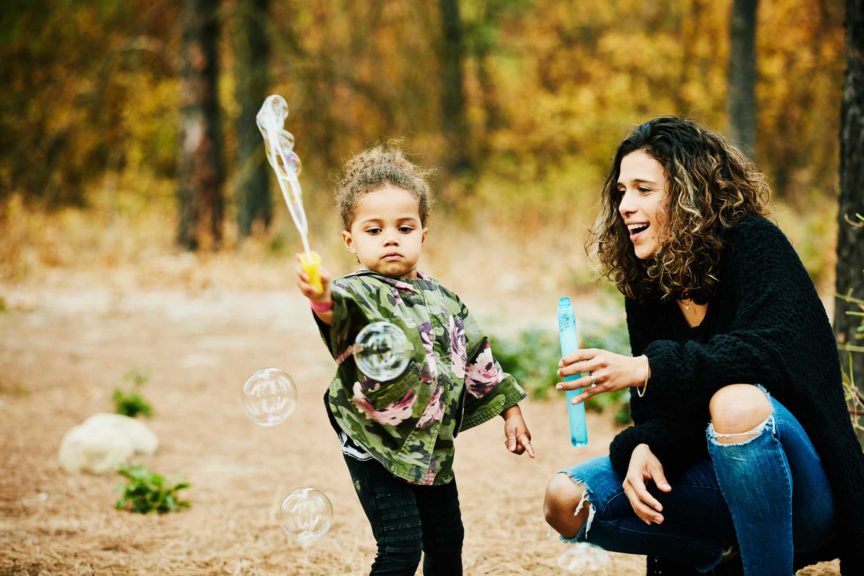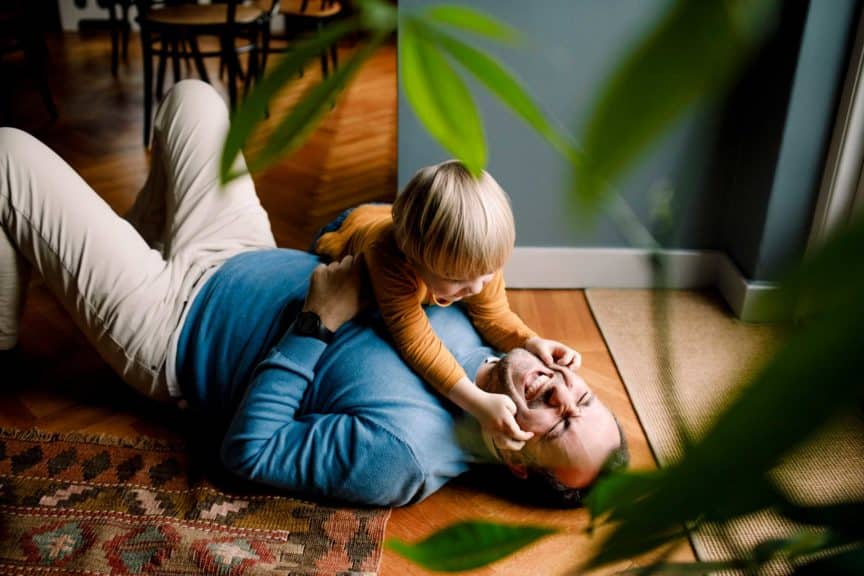Too much of our time is spent trying to
Donald Miller1
chart God on a grid, and too little is
spent allowing our hearts to feel awe. By
reducing Christian spirituality to formula,
we deprive our hearts of wonder.
In the Path of the Divine
Spiritual parenting is not perfect parenting—it’s parenting from a spiritual perspective with eternity in mind. It’s a way of parenting that declares, “I want to parent the child or children that God gave me in such a way that I first honor God, and then second, create the best environment to put my children in the path of the Divine.”
What does it mean to put my child in the path of the Divine? Only God is divine. His divinity is the essence of His holiness, which ultimately transforms each of us. Through Jesus and His work on the cross, God transfers His holiness to me.
This transaction takes place by God’s grace and through my faith, of course, but how it actually happens is a mystery.
As spiritual parents, we enlist ourselves as students of our children … to learn about them specifically as the children God has entrusted to us. Not only do I need to learn how to rely on God, but I also need to learn how my children are fearfully and wonderfully made in order to best guide them on the path that God has designed specifically for each one.
I will need to adapt my parenting to the uniqueness of each child (while still retaining my authority and values).
Parenting “Aha!”

Since God’s Word makes it clear that He alone is divine and He alone changes hearts, I knew I needed Him to help me parent differently. I knew I would have to parent with His goal in mind if I was going to be successful.
This was the first truth I began to cling to in my desire to be a spiritual parent. This truth revealed to me that it was not my job to merely control my child’s behavior and by doing so somehow create a spiritual life for him or her.
Nowhere in the Bible does God ask me to spend my days managing the deeds and actions of my child. Nowhere in Scripture am I warned that if I don’t “control” my child’s behavior, horrible things will happen.
However, I have oftentimes assumed this role—and sometimes pursued it as an end in itself.
Igniting a Transforming Faith
It was one thing for me to make sure that I taught them Bible stories and took them to church on Sunday mornings. I felt confident that I could teach them good morals and values and could for the most part keep them away from the dangers of this world. I even knew I could intentionally expose them to godly people and benevolent causes.
But if my job was not to merely control my children’s behavior in these matters, then what was it?
I realized that my goal was much more grand than I had imagined—much more compelling. My goal was to pass on a vibrant and transforming faith, the kind of faith in which:
- My children would know and hear God’s voice, discerning it from all others.
- They would desire to obey Him when they heard His voice.
- They would obey Him not in their own power, but in the power of the Holy Spirit.
One question still lingered. It haunted me in my depths. How would I pattern my parenting in such a way that these things I knew were essential would ignite in my children vibrant, spiritually transforming faith?
I longed for a place where I could talk about these things and be enlightened and equipped.
Eternity Is at Stake
Spiritual Parenting is birthed out of that longing.
What you believe and where you aim your heart determines the direction and outcome of your entire life for eternity.
Whether we are single parents or part of a blended or traditional parenting model, the most significant part of our lives—and our children’s lives—is our spiritual health. In fact, researcher George Barna once stated that every dimension of a person’s life experience hinges on his or her moral and spiritual condition.2
Think about it: What you believe and where you aim your heart determines the direction and outcome of your entire life for eternity.
Read it again.
Eternity is at stake.
In the World but Not of It
As a young mom, I was spending far too much energy on keeping them from the things I deemed harmful or sinful (essentially doing my best to control their behavior) because I was scared.
Oftentimes parents, recognizing the evil in the world, determine to take their child out of it completely. So they hold their children really, really close and really, really tight in an attempt to shield them from what is threatening.

Some others simply push their children into the world, almost like throwing a child into the deep end of the pool and saying, “They’ll learn how to swim eventually.”
These parents often rationalize this approach by their own journey.
Neither of these extremes is biblical. The Christian life calls us to be in the world but not of it.
Spiritual parenting doesn’t ignore the world’s depravity. I propose that spiritual parenting proclaims, “I’m going to stand here in the midst of it all. I’m going to live in the world because God has placed me here in it for this time. I do this, and yet I recognize that we are aliens, as the apostle Peter states. This world is not my home. It never will be. I will never feel completely comfortable here. I will never feel that I truly fit in. So while I’m here, I’m not going to be of it.”
It determines, through God’s help, how we will live productive and spiritual lives here and yet not become comfortable in the world around us. Really, this dependence on God and His Spirit is at the heart of being a spiritual parent.
How We Define Ourselves
Maybe some of you are like me. Raised in a Christian home, I often felt defined by the things that I didn’t do. To not smoke, not drink, not swear, not chew, and not go with boys who do (such a helpful little rhyme) was how I defined myself for the most part.
But what would it look like if we parented a generation of young people to define themselves by what they did do?
What if they were defined by their actions of justice and mercy, forgiveness and love, strength and courage, generosity, compassion, and humility and faithfulness? What if they were a generation who lived in the world and still proclaimed these things by their very lives?
The danger in merely focusing on our children’s outward behavior without the inner transformation is that sometimes our children will align their behavior to our mandates to please us or receive approval. They can end up doing or not doing these things without true spiritual healing inside.
What would it look like if we parented a generation of young people to define themselves by what they did do?
Before long, after the external motivations for obedient behavior are eliminated, our children will grow up and determine life for themselves. Either they will have been transformed by God’s Spirit, they will have chosen to live sinfully without any desire to change, or they will hide their sin and live a double life.
But a spiritual life is one that is transformed and out of hiding.
Strangely Dim
Now what if we as spiritual parents agreed to do something different than merely manage our children’s behavior? What if we put our energy toward setting our children in the path of the Divine and watching them fall in love with Jesus? What a remarkable difference this would make!
When I was little, I used to sing a song in church, and I have come to understand these words in richer and more meaningful ways during my adult life:
Turn your eyes upon Jesus,
Look full in His wonderful face,
And the things of earth will grow strangely dim
In the light of His glory and grace.3
I have realized how profound these words are in my life and in the lives of my children. The song doesn’t direct me to turn away from the world, but rather to turn to Jesus. Just as the author of Hebrews calls us to “fix our eyes on Jesus, the author and perfecter of our faith” (Heb. 12:2), the charge is to look to Jesus.

When I do this, the world suddenly grows dim in its allure, and I begin to love it less as I love Jesus more.
Living Testaments
What better way to have our children fall in love with Jesus than for us to be living testimonies of what that means? One thing is true in spiritual parenting: You can’t give away something you don’t have!
Think about it. We want so much for our children.
We are guilty even of sometimes wanting them to have a more genuine spiritual life than we do. But the fact is that we are living examples of what is real, and unfortunately, we can’t give away something we don’t possess.
So spiritual parenting reminds me that it’s not my job to merely control my children’s behavior, but rather it is my job to model with authenticity what I have in my relationship with God through Christ.
And hopefully what I have is worth passing on to the next generation.
Natural Flow of Life
Our children hunger to see the reality of who God is in the natural flow of our lives—when we’re getting up, when we’re sitting down, when we’re on a journey, when we’re putting them to bed.
Our children need to see that faith matters, that it’s relevant to our daily situations, that it’s real. We need to model how our lives are spiritual in every decision, erasing the divide between sacred and secular.
Some of my best moments of sharing the reality of God with my children were ones I didn’t plan. They just happened.
Behavior as a By-product
In order to pass on our faith to our children, we need to understand what biblical faith is and how it is connected to action.
Our children hunger to see the reality of who God is in the natural flow of our lives—when we’re getting up, when we’re sitting down, when we’re on a journey, when we’re putting them to bed.
Perhaps the fullest definition of faith comes from its meaning in the original Greek.
The word pistos embodies three things: possessing a firm conviction, making a personal surrender, and demonstrating the corresponding conduct.
Too often we merely focus on the “corresponding behavior” part, missing the point that it is a by-product. This by-product is the outcome of a firm conviction (which is something we probably most intuitively know about faith), but it’s also from a posture of personal surrender.
This aspect of surrender is something we don’t always acknowledge in our own lives, let alone teach to our children. In simple terms, faith is based on a strong belief from a heart of self surrender.
Cultivating Environments
What is our job then?
The joy of parenting can be spent on cultivating environments for our children’s faith to grow, teaching them how to cultivate a love relationship with Jesus as we cultivate our own, living our lives authentically in front of them so that they become eyewitnesses to our own transformation.
As a young teenager, I heard my dad get up early every morning to go downstairs. I never heard the TV or heard busyness in the kitchen, but one day I saw what he had been doing down there every morning. He was kneeling, praying, and reading God’s Word.
I can’t remember my dad ever telling me I “should” read my Bible, but it was modeled for me quietly and consistently—and that was captivating to me. Understanding our part in this process of spiritual parenting is foundational for us before we embark on the rest of this book.
Discovering My Role as a Parent
View your role as a spiritually minded parent, the God-given role that is yours alone. Essentially, it asks the question, “What is my end goal in raising each of the children God has entrusted to me, and then how will I parent them with that end in mind?”
What you believe and where you aim your heart determines the direction and outcome of your entire life for eternity.
With this perspective, I can take my focus off of a series of day-to-day events and set it on the bigger picture of passing on my faith. Each moment of every day becomes an opportunity to parent toward my God-given goal. I parent in a way that does not simply spend my hours but also allows me to invest my days toward eternity.
Our goal as parents should be to endeavor to pass down our faith to the next generation in such a way that they will be able to pass down their faith to the following generation in our absence.
Someday we won’t be here, and all that will remain is that which is eternal—those things that we have successfully transferred to our children, and our children’s children, so that faith will endure to all generations.

Ready to help parents create an environment for spiritual growth?

Ready to help parents create an environment for spiritual growth?

Ready to help parents create an environment for spiritual growth?
1. Donald Miller, Blue Like Jazz (Nashville: Thomas Nelson, 2003), 205.
2. George Barna, Transforming Children into Spiritual Champions (Ventura, CA: Regal, 2003), 12.
3. Helen Lemmel, “Turn Your Eyes upon Jesus,” 1922.
Excerpted from Spiritual Parenting.
© 2010 Dr. Michelle Anthony. Spiritual Parenting is published by David C Cook. All rights reserved. Publisher permission required to reproduce. Taken from Chapter 1, In the Path of the Divine. Portions from pages 11-26.







